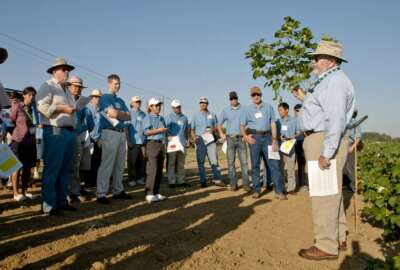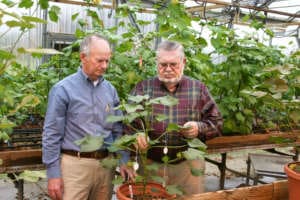
USDA employee recognized for over 5 decades of civil service
Johnie Jenkins wins his second Presidential Rank Award after almost 58 years spent at the Agriculture Research Service. He joins Federal News Network to talk about...
Best listening experience is on Chrome, Firefox or Safari. Subscribe to Federal Drive’s daily audio interviews on Apple Podcasts or PodcastOne.
One reason the United States cotton industry is competitive worldwide is the work of a distinguished and long-serving scientist — and his team — at the Agriculture Research Service.

Johnie Jenkins has worked for ARS — an organization within the Agriculture Department — for almost 58 years. Jenkins, a supervisory research geneticist, is a winner of one of the 2018 Presidential Rank Awards in the category of distinguished professional.
“Fifty-seven years after I began to work for the agency, I still believe it’s the best research agency in the world,” Jenkins said on Federal Drive with Tom Temin. “I do recommend people to work with ARS. We are problem solvers and we’ve solved a lot of great problems … not just [for] the farmers, but for the American public.”
Even as a member of the federal service, Jenkins has a lot of interaction with the every day farmers and producers. He said his career wouldn’t be the same without other people. In the Dec. 10 interview, he told Federal News Network he was proud of his published manuscripts, many with over 200 signets. He’s also trained at least 75 graduates that have gone on to make major contributions in the agriculture sector.
“I learned a long time ago that it’s better to cooperate with people than to fight with people. By cooperation, you get a lot more done,” he said. “When you put two people together, let them cooperate on a project and you get a net result of about four — not a net result of two —because they feed on one another and the ideas are productive this way.”
Genomics R&D
Jenkins is a credited member of the team able to get rid of a particular pest that made growing cotton a nightmare. This wasn’t done through the use of poison however, but certain genetic engineering techniques.
“Some of our young farmers today have never seen a boll weevil (a type of beetle). At one time, this was a major scourge in the entire U.S. cotton production industry. But through concerted efforts of ARS, state [partners] and the growers themselves, we were successfully able to eradicate the boll weevil,” Jenkins said. “I played a small part of that.”
The project began in a laboratory in 1961. Over the next decade, they were able to develop 10 to 12 different genetic techniques. Through pilot testing, the team developed a method used to alleviate the problem for good in most places: Pheromone traps.
Related Stories

Dozens of states express interest in hosting new locations for two USDA bureaus
He also worked with his team at USDA, members of the biotech industry and the Environmental Protection Agency, to help test and develop strains of cotton resistant to certain pests, insects and nematodes (microscopic worms, insects).
“We continue to look ahead and see when the next problem is going to be arising. When you’re growing your crop and you solve one problem, there’s always some other problems that occur,” Jenkins, supervisory research geneticist, said. “So what keeps me going is looking at what can we do to help the American producer.”
He said what science is able to achieve now is what they were dreaming of when he was in graduate school.
Accolades
Much of USDA and ARS’ success in this area is due to those advances in genomics.
“Since that time, we’ve now learned how to do these things,” he said. “One of the major advances in genetics that’s been very helpful [for] breeding programs in all crops is to find molecular markers. We now can find a DNA tag for any particular gene that we have that we need to put into a plant. Then we can use this genetic tag to determine when a gene is present in a plant [and] when it’s not present in the plant.”
He said it was a major breakthrough for even the commercial industry.
Jenkins was inducted into the ARS USDA Science Hall of Fame in 2007 for his work developing pest-resistance strains and plant-mapping techniques. This is not his first Presidential Rank Award either. In 2008, he received the Award of Meritorious Executive for his plant-mapping work.
When asked about retirement, Jenkins shrugged it off.
“Retirement, I guess, is always an option. I could have retired about 30 years ago. But now I look back and say, gee, what would I have really missed,” he said. “I’ve really had almost two careers lengthwise with ARS. That’s been a lot of fun. It’s been very productive.”
Copyright © 2025 Federal News Network. All rights reserved. This website is not intended for users located within the European Economic Area.
Steff Thomas is a digital editor at Federal News Network.




